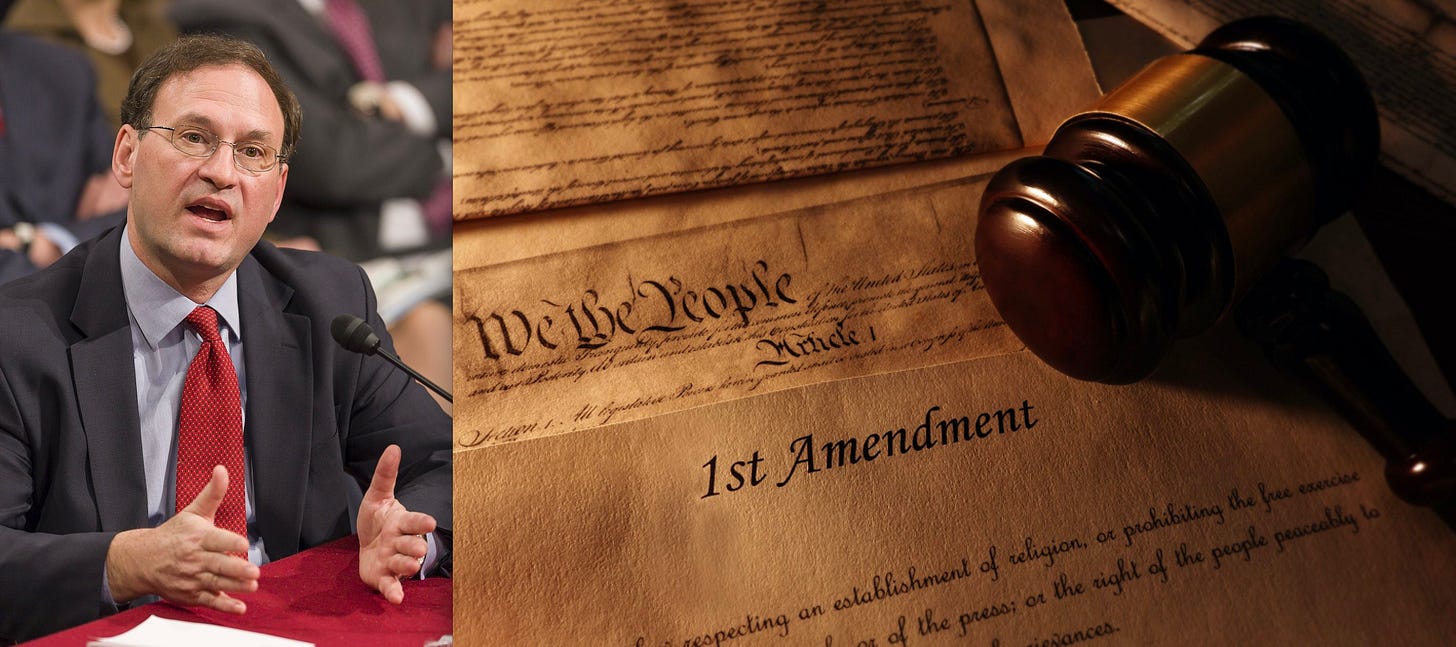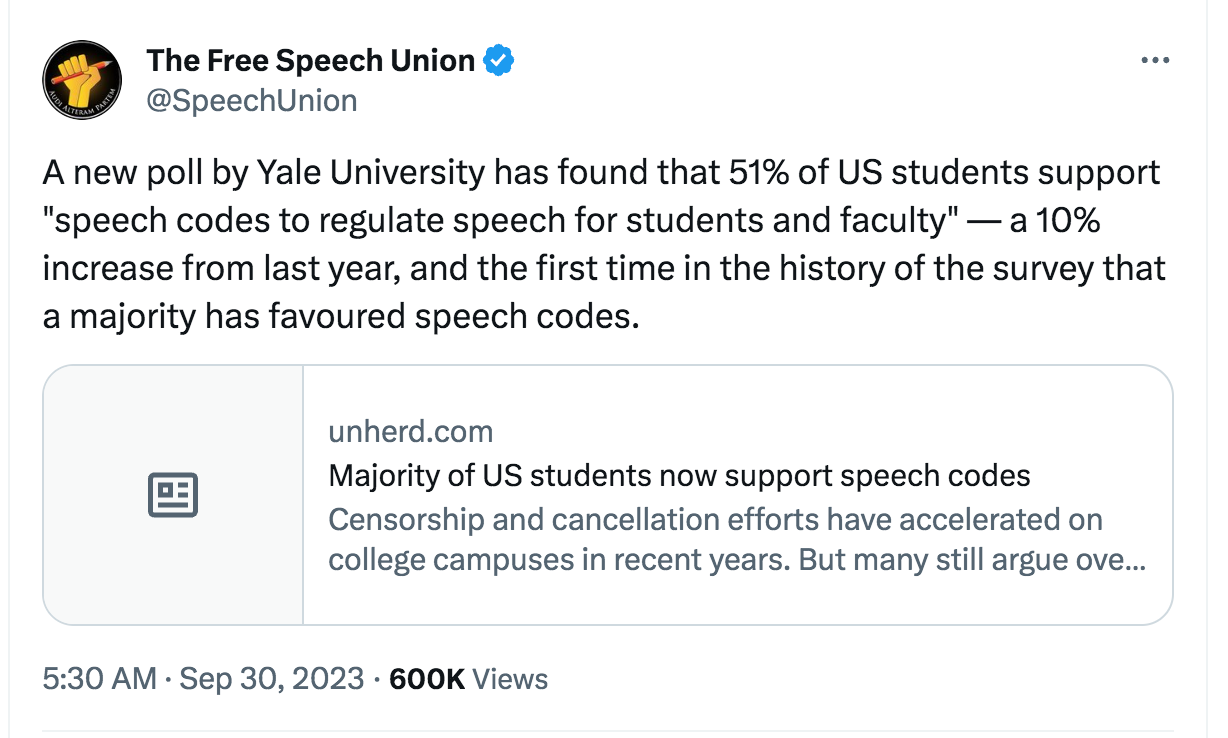E-Pluribus | October 2, 2023
One Supreme Court justice's take on the First Amendment; utopianism by any other name; and a look back at 180ism.
A round-up of the latest and best writing and musings on the rise of illiberalism in the public discourse:
James Taranto & David B. Rivkin Jr.: Justice Alito’s First Amendment
As James Taranto & David B. Rivkin Jr. tell it at the Wall Street Journal, Supreme Court Justice Samuel Alito’s view of free speech and the First Amendment makes him unique among his peers. When the framers wrote some of the most famous words in the English language in the late 1800s, were they advocating anything goes, or was their focus more narrow? Per Justice Alito, political speech deserves far more deference from the Constitution than more pedestrian realms of expression.
One of America’s great First Amendment pieties holds that the Constitution protects “the principle of free thought—not free thought for those who agree with us, but freedom for the thought that we hate.”
That observation comes from Justice Oliver Wendell Holmes’s dissent in U.S. v. Schwimmer (1929). A subtly more sweeping variation—you might call it the anything-goes theory of the First Amendment—is that any limit on speech opens the door to broad censorship, and therefore if the courts protect speech that has no obvious value, we can be confident of their vigilance against limiting speech that really matters.
[ . . . ]
Justice Samuel Alito . . . vigorously rejects the anything-goes theory. “The First Amendment was not intended to prohibit any regulation of speech,” he said in a Journal interview on July 7. On occasion that view has left him alone in dissent against a free-speech claim.
Even so, in the vast majority of cases he’s a strong defender of the freedom of speech. He accepts Holmes’s dictum and cited it in Matal v. Tam (2017), in which the court held that the government had violated a rock band’s constitutional rights by denying its trademark application for its racially insensitive name.
[ . . . ]
When the court first heard Citizens United in 2009, Justice Alito asked Deputy Solicitor General Malcolm Stewart if federal campaign-finance laws applied to books. When Mr. Stewart said they did, Justice Alito got to the heart of the matter: “The government’s position is that the First Amendment allows the banning of a book if it’s published by a corporation?” Rearguing the case a few months later, then Solicitor General Elena Kagan admitted: “The government’s answer has changed.”
Yet Justice Alito has rejected free-speech claims when “what we were dealing with was speech that had little if any value, and there were established and cabined rules for saying that it shouldn’t be protected in those cases,” he says. He wasn’t yet on the court when it decided Free Speech Coalition but cites a “trilogy of cases” in which he dissented on this basis[.] [ U.S. v. Stevens (2009), Snyder v. Phelps (2011), U.S. v. Alvarez (2012)]
[ . . . ]
As he deliberated over these cases, Justice Alito weighed the anything-goes approach. “I did think at the time of those decisions: You know, my colleagues might have something,” he says. “If we say that . . . free speech has to prevail even in these outrageous situations, maybe in a later case, when what’s involved is important speech, they’ll hold firm, they’ll resist the pressure to give in.”
Read the whole thing.
Jonah Goldberg: Who Wants to Buy a Monorail?
Politics is often described as the art of compromise, but the further out from the middle of the ideological spectrum one goes in either direction, the less likely compromise becomes. One manifestation of that phenomenon is the “soft utopianism” Jonah Goldberg describes in his latest G-File at The Dispatch. Just wanting everything to be perfect is great, but realities cannot simply be wished away, Goldberg writes.
Soft utopianism depends on the “seen” with no consideration of the “unseen.” This is a reference to Frédéric Bastiat’s parable of the broken window. In his story, someone breaks a shop window and someone sagaciously spins this as a good thing because it will create work for the windowmaker. Bastiat’s point is that this is true. But it misses the fact that the shop owner will have to spend money to fix the window that he could have spent on something else.
This is the central difference between productive capital and unproductive capital. When you get a flat tire, as I recently did, you create work for the tiremaker and the mechanic. But all you get for your spent money is a restoration of the status quo ante. If flat tires made everybody richer, we’d all be in our driveway slashing our own tires.
Vast swaths of the green transition amounts to the broken window fallacy on a massive scale. Like the drunk who looks for his lost car keys under the street light because the light’s better there, we look for solutions that can be seen, even when they don’t exist there.
Electric cars have benefits, but they also have massive unseen costs. You might feel virtuous skipping the gas station, but the juice has to come from somewhere. If you live somewhere where electricity comes from coal, your Tesla is a coal-powered car, once removed. You may think that oil production is an ugly crime against nature. Fine. But lithium isn’t fairy dust. Mining it is an ugly, nature-wrecking, carbon-intensive process. Conventional cars are mostly made from plentiful materials with large, economically efficient supply chains. Electric vehicles, not so much.
[ . . . ]
Diversity mongers focus on the visible, end-results, of a process without heed to the costs and trade-offs required upstream or the unintended consequences further downstream. “This company only has X percent of black people on the board, that school only has Y percent of Hispanics. Let’s force them to change that!” But they don’t think—or care—about the trade-offs of remedying that discrepancy at the point of visibility.
Read it all here.
ICYMI: Yascha Mounk: The Perils of 180ism
In 1983, Phil Collin’s band Genesis might have been describing what Yascha Mounk calls “180ism” in this June 2021 Persuasion essay that you may have missed. “I could say day, and you'd say night / Tell me it's black, when I know that it's white / Always the same, it's just a shame and that's all,” Collins sang. In his essay, Mounk says we’ve similarly become too accustomed to defining what is acceptable by taking the opposite view of whatever our “opponent” says.
This is the world of 180ism. According to the logic of the moment, you must either think that Dr. Seuss never made a cringe-worthy drawing or that we should cheer when public libraries remove his early books. You must either believe that antifa is a major threat to national security or defend the right of a bunch of extremists to beat up anyone they consider a fascist. You must either cheer when state legislatures tell teachers what they can say in the classroom or celebrate that a growing number of them are telling students to make their racial identity central to their lives.
180ism has three core components.
The first and most obvious is that the primary question most participants in public debate ask themselves is not “How do my values inform my views on this matter?” or “What is the evidence for what is being asserted?” Rather, it is “How do I demonstrate that I am a loyal member of my political tribe?” As it happens, the easiest way to do that is simple: Look for what the enemy says on any one issue and stake out the opposite position.
The second component is that public discourse becomes dangerously narrow when a lot of individuals with big platforms reflexively contradict whatever their adversaries say. Complex questions that should, in principle, allow for a large number of different answers are then flattened into a simple referendum between diametrically opposed sides.
The third component is that the dynamics of 180ism exert enormous pressure on anybody who does not behave as expected. If, unwilling to let the discourse shoehorn you into one of two sanctioned positions, you insist on giving a third answer, you are denounced as an attention-seeking contrarian. And if, following your long-held values or principles, you come up with an answer that your political adversary happens to agree with, you are denounced as a traitor. In a discourse dominated by 180ism, occasionally disagreeing with your friends—a sign that you are willing to think for yourself—is widely interpreted as proof of bad faith.
Read it all.
Around Twitter
The Free Speech Union is concerned about the attitudes of US students and free speech, but not everyone sees it the same way. Conor Friedersdorf, Nicholas Grossman, and James Surowiecki weigh in:
Glenn Greenwald raises concerns about government censorship north of the border:
And finally, thanks to the Chicago alderwoman who sets the record straight on “cultural differences” discussed via baseball bats:











